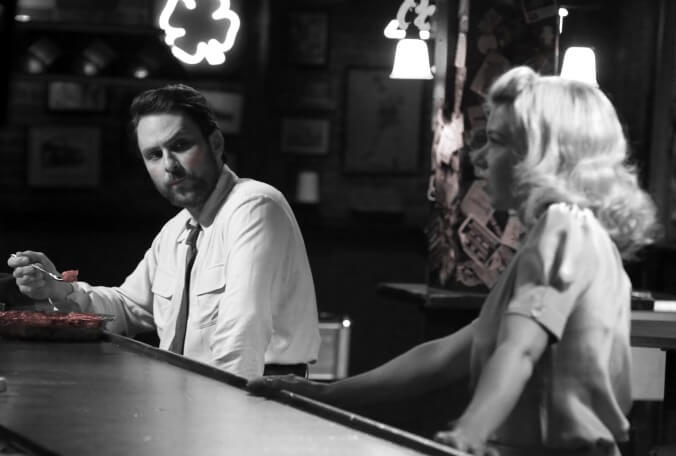Charlie is his own film noir hero in tonight's killer It's Always Sunny pastiche


Just a poor sap doin’ the two-step to nowhere.
That’s our Charlie Kelly, born in the gutter outside the baseball stadium and destined to die—in the gutter outside the baseball stadium. If It’s Always Sunny In Philadelphia has a hero (and it really doesn’t), it’s this abused, neglected, feral, beaten-down but somehow indefatigable little monster, the Gang’s collective mop-up boy. Getting inside Charlie’s head has accounted for some of the most perversely affecting moments in Sunny’s history, the occasional revelation of Charlie’s true view of his hardscrabble life equal parts deeply touching and queasily horrifying, if you think about it too much.
“The Janitor Always Mops Twice” is another daffy but slyly heartbreaking spelunking expidition into the depths of Charlie Kelly’s mind. It’s a stunt episode that works—and that beautifully—because its transformation of yet another ludicrous Paddy’s scheme of ludicrously irresponsible venality into a 1940s black-and-white detective mystery with Charlie at its center allows us another glimpse of just how Charlie sees his place in his world. And how, in another, he might have been something.
Written with applause-worthy nimbleness by Megan Ganz, and helped immeasurably by Heath Cullens’ direction and John Tanzer’s black-and-white (with isolated splashes of cherry red) cinematography, the episode starts with a film noir Charlie—still Paddy’s designated Charlie Work laborer—pronouncing himself, in straight-faced gumshoe patter as he staggers across a gore-streaked Paddy’s, “An honest man spilling his guts on a dive bar floor.” The toughest plate for any Sunny episode to keep spinning is that balancing Charlie’s undeniable victimhood with his even more undeniable, occasionally dangerous madness. Here, we’re initially given Charlie as Philip Marlow, the perpetual underdog in a city of powerful monsters, the one man with a code in a town with none. But we also, throughout the episode, see that Charlie is still Charlie—the stunted, tattered wild card whose incomplete understanding of how to be a human being often brings disaster to those he’s so desperate to draw close.
Which brings us to the plot, an ingeniously grubby caper involving bootleg maraschino cherries, Cricket in a dress, Frank being “diarrhea-poisoned,” and the central role of the knockout with the heart of ice filled, naturally because it’s Charlie, by Mary Elizabrth Ellis’ The Waitress. Charlie Day is front-and-center all episode, which is never a bad thing, but his performance as Paddy’s janitor/crusading private eye provides Day with a unique chance to fill in some more of the scattered puzzle that is Charlie. His Walter Neff-style narration (his day started “with a white lie and ended with the dark truth,” leaving the wounded Charlie wishing for “a pretty girl with soft lips and a nursing degree”) sets the right tone of unblinking mock solemnity, while veering into laugh-out-loud application of hard-boiled dialogue to Charlie’s grossly mundane reality. Musing over the mess he’s just cleaned up in Paddy’s bathroom as he prepares himself a paper-bag-and-glue cocktail in the office, Charlie describes the grisly scene as “The victim—a handicapped stall. The murderer—a butt.” And things only get messier from there.
Dennis (introduced with Charlie’s “And that’s when trouble walked in like it always does, on a great set o’ legs.”) and Mac are Frank’s goons. Dee, too, although, even in Charlie’s imagination, she tries to recast herself as the story’s femme fatale. (“I get more of a goon vibe from you,” Charlie breaks in.) Frank is crouched in Dee’s beshitted apartment, moaning, his protestations of bad shrimp not fooling the dogged Charlie, who smells a mystery, among other, more horrible, horrible things. His trail leads Charlie to the darkest underbelly of Philadelphia (Paddy’s basement), giant vats of blood-red goop, and The Waitress, found on her knees in an alley, a big palooka (Wass Stevens) towering over her, a ruined cherry pie at her feet.
Sunny has done these go-for-broke goof-off flights of fancy episodes before, to seriously mixed success. Revolutionary War flashback? Diverting enough for a lark. Frank’s period reminiscence of his brother and the lost love of his life? Easily the worst episode the show’s ever done. After 14 years, some stylistic experimentation is to be expected, and sometimes welcomed. (Redeeming Frank here, the episode told entirely from Frank’s first-person point of view remains a devastating snapshot of just how one fading old scoundrel’s perspective on a days’ worth of the Gang’s awfulness is completely unguessed-at by his friends.) But “The Janitor Mops Twice” may be the best yet, its sneaky rooting in what we know, or think we know, about Charlie Kelly informing every flat-footed step.
There’s a weakness built into Ganz’s script, I suppose, in that there’s no framing device—leading into or out from the main story—to explain the gag. But I’ve decided the final product is so good as to render any complaints about that fact petty. Seriously, I just decided. We can assume that Charlie watched The Postman Always Rings Twice playing over the air on his crappy TV. Or that he cobbled together the plot and milieu from a dump-scavenged copy of The Big Sleep on the toilet down the hall. Or maybe these memories of stalwart pre- to post-war two-fisted crusaders are the flickering, half-remembered late show images of The Glass Key and The Big Heat young Charlie saw while studiously shutting out his loving but horrifyingly neglectful mother’s parade of sexual exploits. The point emerges that Charlie can graft himself onto a story of a brave, principled, unwavering champion even in the midst of his truly awful daily existence, and that’s just achingly beautiful, and sad.
And hilarious, of course, as even Charlie’s wildest fantasy of romantic action hero can’t help but admit some unpalatable reality into the mix. Rescuing The Waitress sees him bantering like a boss (“You don’t seem like the straightening type,” she coos appreciatively, sashaying away, “Maybe it’s because you’ve got me all twisted.”) But when she comes to seduce Charlie at his apartment later, The Waitress can’t help but momentarily break character at the stench of Charlie’s rotgut-and-catfood cocktail. When he tries to brace goons Dennis and Mac at a Paddy’s party where underage drinkers swill down a suspicious punch they call Red-40, their tough-guy patter breaks down as soon as the Mac in Charlie’s mind can’t help but miss the point. (“Don’t add on,” barks Dennis, “There’s a rhythm.”
Even the mystery, low-rent as it turns out to be, is fiendish in its cleverly gross construction. The idea that The Waitress, having sussed out that Frank’s bananas plan to corner the Philly bar maraschino cherry concession (after the garish dye, “Red-40,” was found to be cancerous) has left him sitting on untold gallons of accidentally fermented cherry slop-liquor, is the mastermind is the sort of twist that would hit Charlie hardest. Perhaps hard enough in his own diarrhea-poisoned state to swim in and out of film noir reverie. Would the episode have been better if that were spelled out in the end? I honestly don’t know, since the episode itself is such a marvelous little gem of a fantasy, and since, even there, harsh reality is always seeping in.
That The Waitress would once more sleep with Charlie just to keep her part in the lucrative scam (selling the cherry-hooch on the sly undercover, largely to her own court-ordered AA meeting) is just another creaky step in the descent down to oblivion and self-destruction she’s been taking ever since Charlie focused his disproportionate and definitely unwanted attentions on her. Blowing Charlie off with a poisoned pie (heavily implied to be tainted with the complicit Cricket’s poop-hands), The Waitress’ villainous moxie is undercut by the desperation in her statement that it’s so that Charlie can’t follow her when she finally flees Philly on a bus. When she explains her deviousness by saying, “You were getting close—or maybe I was,” it sums up the pair’s fraught, horribly co-dependent wallowing with an exhausted hint of unwanted truth. If we’re to assume that, at the core of Charlie’s filmic fever dream, the basic details of the story are true, then that means that Charlie really was The Waitress’ hero, if just for that one moment in the alley. Sure, he misunderstood the situation, got in over his head, fell for the wrong dame, got conked into unconsciousness, and wound up smarting and wiser but no richer, but that’s the best role that Charlie Kelly can see for himself. Philly’s filthy Philip Marlowe, beaten, betrayed, but unbowed, always doomed to get up the next morning and start it all over again.
Stray observations
- Charlie’s heroism stays cleverly grounded in Charlie work. He escapes from the palooka’s clutches (he’s actually The Waitress’ concerned, angry sponsor) by pouring a cocktail glass full of ready ammonia into a waiting trash basket’s worth of bleach. “Built up a healthy tolerance over the years,” Charlie boasts to the gasping thug, “Or unhealthy. Depending on how you look at it.”
- Not so clever is his final gambit to thwart The Waitress’ poisoned pie, as the shot of bleach with which he coated his stomach turns out not to be the universal antidote he thought it was. “Are you still eating that pie?,” asks The Waitress, breaking character.
- And, hero or not, Charlie’s questionable cleaning skills remain. “That’s the thing about messes,” he explains, smooshing a red stain around Paddy’s floor, “They never go away, just spread around.”
- Mac, unsurprisingly, makes a terrible goon, despite his impressively maintained muscle mass, being taken out by Charlie by a judicious application of paper bag-glue.
- Charlie launches into a line of come-on patter at the appearance of a hooded female figure in Paddys, only to break out with a colloquial, “Aw shit, it’s you?” when it’s revealed to be Dee.
- Charlie, trying to narrow down Frank’s possible enemies, sighs he’s found “enough beef to open a hamburger store.” His list, in Charlie-scratch: “HUH-WANG; THE WAYTOR; PON D; ARRTEMIS; LEE AM MIC POYL; BEN THE SOULJA; UNCLE JAX; GAIL (with snail doodle); Z; REX; FISH FACTORY ASIANS.”
- Charlie, bracing Cricket over the revelation of Frank running a “cherry racket,” exclaims in horror, “You tellin’ me Frank’s running underage girls?” Cricket: “I wouldn’t put his past him, but, no, that’s not what I’m talking about.”
- Whatever inspired Charlie, some of his voiceover is genuinely inspired. “Only two things you can do in the dark: you can drink and you can hide,” is followed by his back-and-forth with The Waitress. Asking if she’s come to shoot him, she asks, “What if I missed?” Charlie: “Then you’d have to say you missed me.”
- The again. Charlie: “He’s gonna wake up with his head pounding harder than a Chinese crossword puzzle.” Waitress: “Huh?” Charlie: “That one wasn’t clear?”